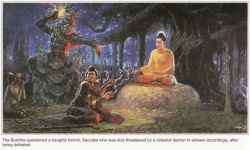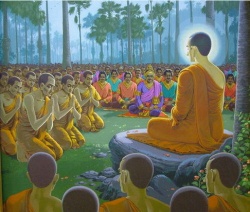Difference between revisions of "Insight in situations"
(Created page with "thumb|250px| Sometimes insight arises at the most unexpected times. This happened to me while living at Wat Pah Pong. The Northeastern part of Thailand ...") |
m (Adminos moved page INSIGHT IN SITUATIONS to Insight in situations without leaving a redirect) |
(No difference)
| |
Revision as of 10:50, 19 June 2013
Sometimes insight arises at the most unexpected times. This happened to me while living at Wat Pah Pong. The Northeastern part of Thailand is not the most beautiful or desirable place in the world with its scrubby forests and flat plain; it also gets extremely hot during the hot season. We’d have to go out in the heat of the mid-afternoon before each of the Observance Days and sweep the leaves off the paths. There were vast areas to sweep. We would spend the whole afternoon in the hot sun, sweating and sweeping the leaves into piles with crude brooms; this was one of our duties. I didn’t like doing this. I’d think, ‘I don’t want to do this. I didn’t come here to sweep the leaves off the ground; I came here to get enlightened - and instead they have me sweeping leaves off the ground. Besides, it’s hot and I have fair skin; I might get skin cancer from being out here in a hot climate.’
I was standing out there one afternoon, feeling really miserable, thinking, ‘What am I doing here? Why did I come here? Why am I staying here? There I stood with my long crude broom and absolutely no energy, feeling sorry for myself and hating everything. Then Ajahn Chah came up, smiled at me and said, ‘Wat Pah Pong is a lot of suffering, isn’t it?’ and walked away. So I thought, ‘Why did he say that?’ and, ‘Actually, you know, it’s not all that bad.’ He got me to contemplate: Is sweeping the leaves really that unpleasant?....No, it’s not. It’s a kind of neutral thing; you sweep the leaves, and it’s neither here nor there....Is sweating all that terrible? Is it really a miserable, humiliating experience? Is it really as bad as I am pretending it is?...No - sweating is all right, it’s a perfectly natural thing to be doing. And I don’t have skin cancer and the people at Wat Pah Pong are very nice. The teacher is a very kind wise man. The monks have treated me well. The lay people come and give me food to eat, and....What am I complaining about?’
Reflecting upon the actual experience of being there, I thought, ‘I’m all right. People respect me, I’m treated well. I’m being taught by pleasant people in a very pleasant country. There’s nothing really wrong with anything, except me; I’m making a problem out of it because I don’t want to sweat and I don’t want to sweep leaves.’ Then I had a very clear insight. I suddenly perceived something in me which was always complaining and criticising, and which was preventing me from ever giving myself to anything or offering myself to any situation.
Another experience I learned from was the custom of washing the feet of the senior monks when they returned from the almsround. After they walked barefoot through the village and rice paddies, their feet would be muddy. There were foot baths outside the dining hall. When Ajahn Chah would come, all the monks - maybe twenty or thirty of them - would rush out and wash Ajahn Chah’s feet. When I first saw this I thought, ‘I’m not going to do that - not me!’ Then the next day, thirty monks rushed out as soon as Ajahn Chah appeared and washed his feet - I thought, ‘What a stupid thing to be doing - thirty monks washing one man’s feet. I’m not going to do that.’ The day after that, the reaction became even more violent...thirty monks rushed out and washed Ajahn Chah’s feet and....’That really angers me, I’m fed up with it! I just feel that is the most stupid thing I’ve ever seen - thirty men going out to wash one man’s feet! He probably thinks he deserves it, you know - it’s really building up his ego. He’s probably got an enormous ego, having so many people wash his feet every day. I’ll never do that!’
I was beginning to build up a strong reaction, an overreaction. I would sit there feeling miserable and angry. I’d look at the monks and I’d think, ‘They all look stupid to me. I don’t know what I’m doing here.’
But then I started listening and I thought, ‘This is really an unpleasant frame of mind to be in. Is it anything to get upset about? They haven’t made me do it. It’s all right; there’s nothing wrong with thirty men washing one man’s feet. It’s not immoral or bad behaviour and maybe they enjoy it; maybe they want to do it - maybe it’s all right to do that....Maybe I should do it!’ So the next morning, thirty-one monks ran out and washed Ajahn Chah’s feet. There was no problem after that. It felt really good: that nasty thing in me had stopped.
We can reflect upon these things that arouse indignation and anger in us: is something really wrong with them or is it something we create dukkha about? Then we begin to understand the problems we create in our own lives and the lives of the people around us.
With mindfulness, we are willing to bear with the whole of life; with the excitement and the boredom, the hope and the despair, the pleasure and the pain, the fascination and the weariness, the beginning and the ending, the birth and the death. We are willing to accept the whole of it in the mind rather than absorb into just the pleasant and suppress the unpleasant. The process of insight is the going to dukkha, looking at dukkha, admitting dukkha, recognising dukkha in all its forms. Then you are no longer just reacting in the habitual way of indulgence or suppression. And because of that, you can bear with suffering more, you can be more patient with it.
These teachings are not outside our experience. They are, in fact, reflections of our actual experience - not complicated intellectual issues. So really put effort into development rather than just getting stuck in a rut. How many times do you have to feel guilty about your abortion or the mistakes you have made in the past? Do you have to spend all your time just regurgitating the things that have happened to you in your life and indulging in endless speculation and analysis? Some people make themselves into such complicated personalities. If you just indulge in your memories and views and opinions, then you will always stay stuck in the world and never transcend it in any way.
You can let go of this burden if you are willing to use the teachings skilfully. Tell yourself: ‘I’m not going to get caught in this anymore; I refuse to participate in this game. I’m not going to give in to this mood.’ Start putting yourself in the position of knowing: ‘I know this is dukkha; there is dukkha.’ It’s really important to make this resolution to go where the suffering is and then abide with it. It is only by examining and confronting suffering in this way that one can hope to have the tremendous insight: ‘This suffering has been understood.’
So these are the three aspects of the First Noble Truth. This is the formula that we must use and apply in reflection on our lives. Whenever you feel suffering, first make the recognition: ‘There is suffering’, then: ‘It should be understood’, and finally: ‘It has been understood’. This understanding of dukkha is the insight into the First Noble Truth.

